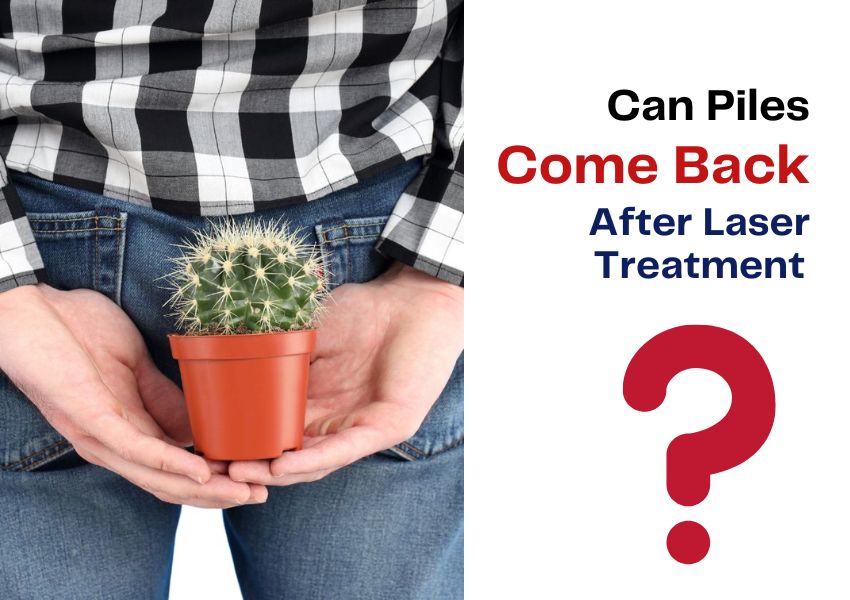As a laser surgeon practicing in Kolkata since 2012, I have had the privilege of treating numerous patients suffering from piles (also known as hemorrhoids).
One of the most common questions I receive from my patients is whether piles can recur after laser surgery. The short answer is: yes, but with specific conditions. Recurrence rate after laser surgery is generally low. Studies suggest that the recurrence rate is around 5%, especially for patients who do not follow post-surgery care and compromise a healthy lifestyle.
In this blog, I will explain why this happens, how laser surgery works, and what you can do to minimize the risk of recurrence.
Understanding Piles and Their Causes

Piles are extremely common: According to the National Institute of Diabetes and Digestive and Kidney Diseases (NIDDK), around 75% of people will experience hemorrhoids at some point in their lives.
Piles are swollen blood vessels in the lower rectum and anus, which can cause pain, bleeding, itching, and discomfort. These may occur due to several reasons, including:
- Chronic constipation or straining during bowel movements
- Obesity and a sedentary lifestyle
- Pregnancy, which increases pressure on the veins in the rectal area
- Age, as tissue elasticity decreases with time
- Prolonged sitting or standing, increasing pressure on the anal region
Piles are classified into four stages, ranging from mild discomfort to more severe cases that might require surgical intervention. In severe cases, where conservative treatments (like lifestyle changes, topical treatments, or dietary modifications) are ineffective, laser surgery has emerged as a revolutionary treatment option.
Laser Surgery for Piles: A Modern Solution
Laser surgery, specifically laser hemorrhoidoplasty, is a minimally invasive procedure that uses focused laser energy to shrink and eliminate hemorrhoidal tissue.
A study conducted by the American Society of Colon and Rectal Surgeons indicates that laser hemorrhoidoplasty has a success rate of 85-95% in the long term, with most patients experiencing significant symptom relief.
It has gained popularity over the years due to its many benefits:
- Minimal pain and discomfort
- Quick recovery time (most patients resume normal activities within a few days)
- Reduced risk of infection
- No need for stitches
During the procedure, a laser fiber is inserted through a small probe and directed to the hemorrhoidal tissue. The laser energy coagulates the blood vessels, causing the hemorrhoids to shrink and eventually heal. Laser surgery is highly effective, especially for grade 1 and grade 2 piles, and offers faster healing compared to traditional surgical methods.
Can Piles Recur After Laser Surgery?
Despite the high success rate of laser surgery, the possibility of recurrence is not entirely ruled out. Several factors can contribute to the recurrence of piles after the procedure.
1. Lifestyle Factors
A major reason for piles recurrence after laser surgery is failure to address the underlying lifestyle factors that caused the condition in the first place. If a patient continues to strain during bowel movements, remains obese, or doesn’t make necessary dietary changes (such as increasing fiber intake), the pressure on the rectal veins can build up again, leading to the development of new hemorrhoids. Therefore, adopting a healthy lifestyle post-surgery is crucial in preventing recurrence.
2. Severity of Initial Condition
Patients with advanced or grade 3/4 hemorrhoids, even after laser surgery, may experience a higher risk of recurrence. While laser surgery can alleviate the symptoms, severe cases may need multiple treatments or a combination of procedures to achieve long-term relief. In such cases, recurrence can be more likely if proper aftercare is not followed.
3. Inadequate Treatment
In some rare cases, the laser treatment may not remove enough tissue or completely eliminate the underlying problem, especially in complex or larger hemorrhoidal formations. While this is uncommon, it can lead to partial relief initially, followed by recurrence. A thorough assessment by an experienced surgeon is necessary to ensure that the most appropriate treatment approach is selected.
4. Age and Weakening Tissue
As we age, the tissue elasticity of the anal and rectal area weakens. This can lead to a greater predisposition to hemorrhoids. Even after successful laser surgery, older patients may be more likely to experience a recurrence, especially if they do not adopt preventive measures like regular exercise and a high-fiber diet.
How to Prevent Recurrence of Piles After Laser Surgery?
While there’s no guaranteed way to prevent piles from coming back entirely, several steps can significantly reduce the risk of recurrence after laser surgery:
1. Dietary Modifications
A diet rich in fiber can help prevent constipation and the strain associated with bowel movements. Fiber-rich foods such as fruits, vegetables, and whole grains soften stools and make them easier to pass. Drinking plenty of water is equally important to maintain proper hydration and digestion.
2. Regular Exercise
Engaging in physical activities, particularly those that enhance bowel movement regularity (such as walking, yoga, and swimming), can help prevent piles. Exercise also helps maintain a healthy weight, which reduces pressure on the rectal veins.
3. Avoid Straining
Straining during bowel movements is a major cause of piles. Patients who have undergone laser surgery should avoid sitting on the toilet for extended periods and should respond promptly to bowel urges. Using the toilet at the same time every day can also help regulate bowel movements.
4. Follow-Up Care
After laser surgery, regular follow-up appointments with the surgeon are essential to monitor healing and ensure that the hemorrhoids do not return. Your surgeon will provide personalized advice on lifestyle changes, medications, and post-surgical care.
5. Maintain Healthy Body Weight
Obesity increases the risk of piles by placing added pressure on the lower rectum. Maintaining a healthy body weight through diet and exercise can alleviate this pressure and reduce the likelihood of recurrence.
Concluding Thought
While laser surgery is a highly effective and minimally invasive solution for piles, recurrence is still possible. The key to preventing recurrence lies in addressing the root causes of hemorrhoids, adopting a healthy lifestyle, and following your surgeon’s aftercare recommendations. As a surgeon who has been treating piles in Kolkata for over a decade, I urge my patients to view laser surgery not as a permanent fix, but as a part of a broader approach to managing and preventing hemorrhoids in the long run.
If you are considering laser surgery for piles or have already undergone the procedure, I recommend discussing your concerns with a trusted healthcare provider to ensure optimal results and long-term well-being.




